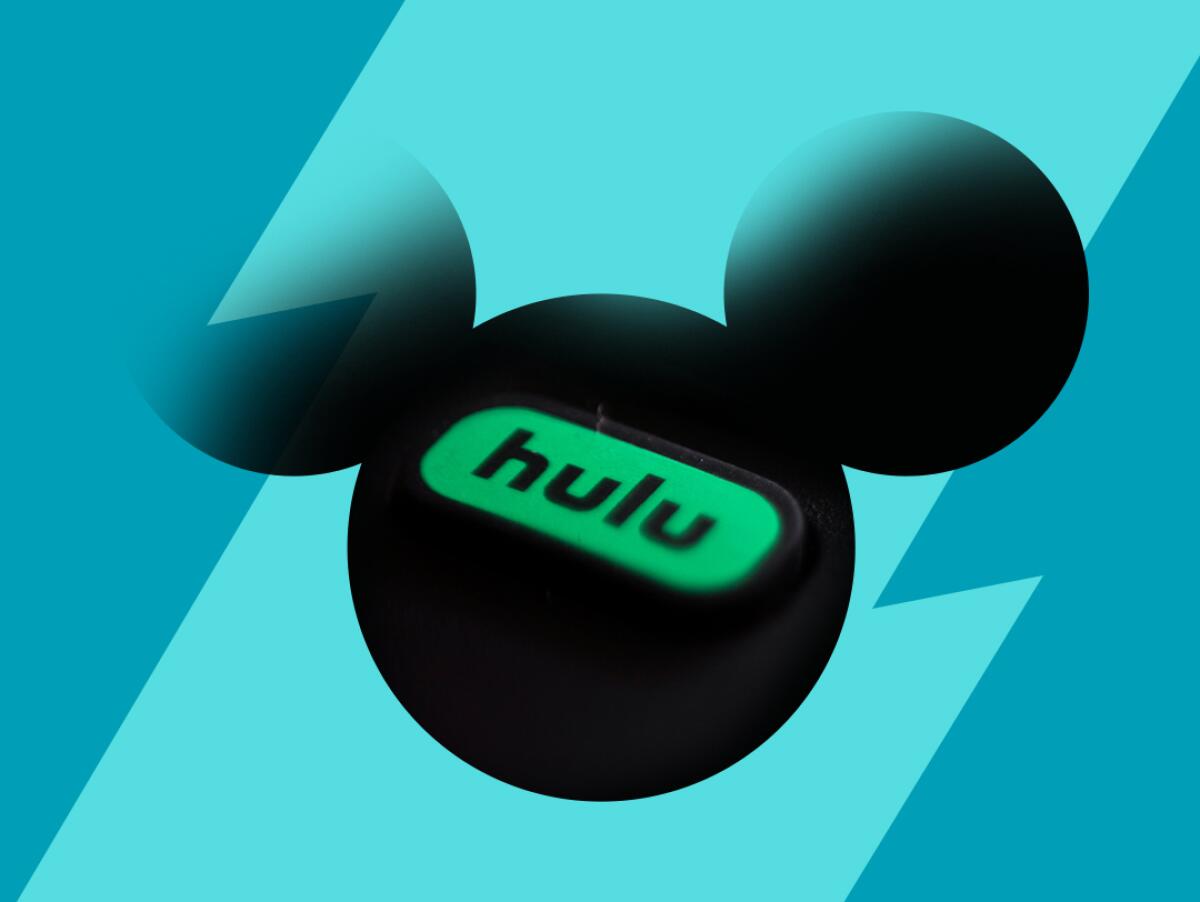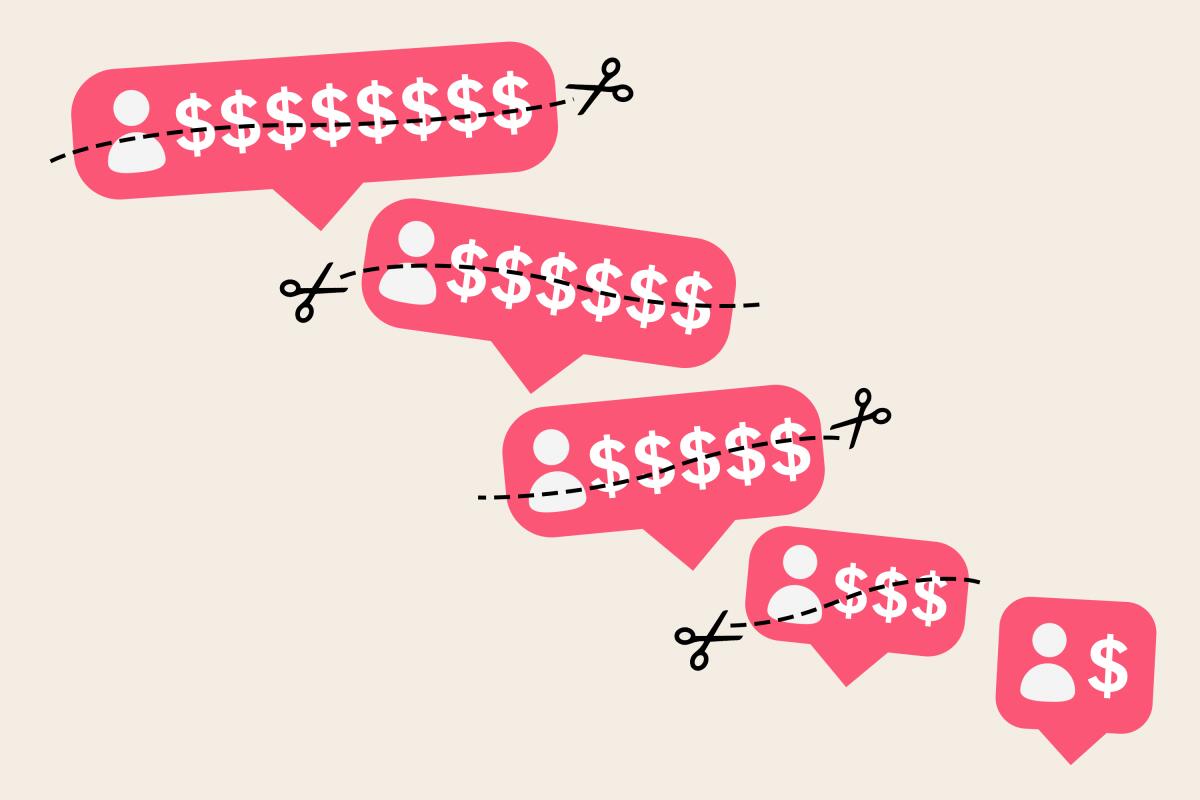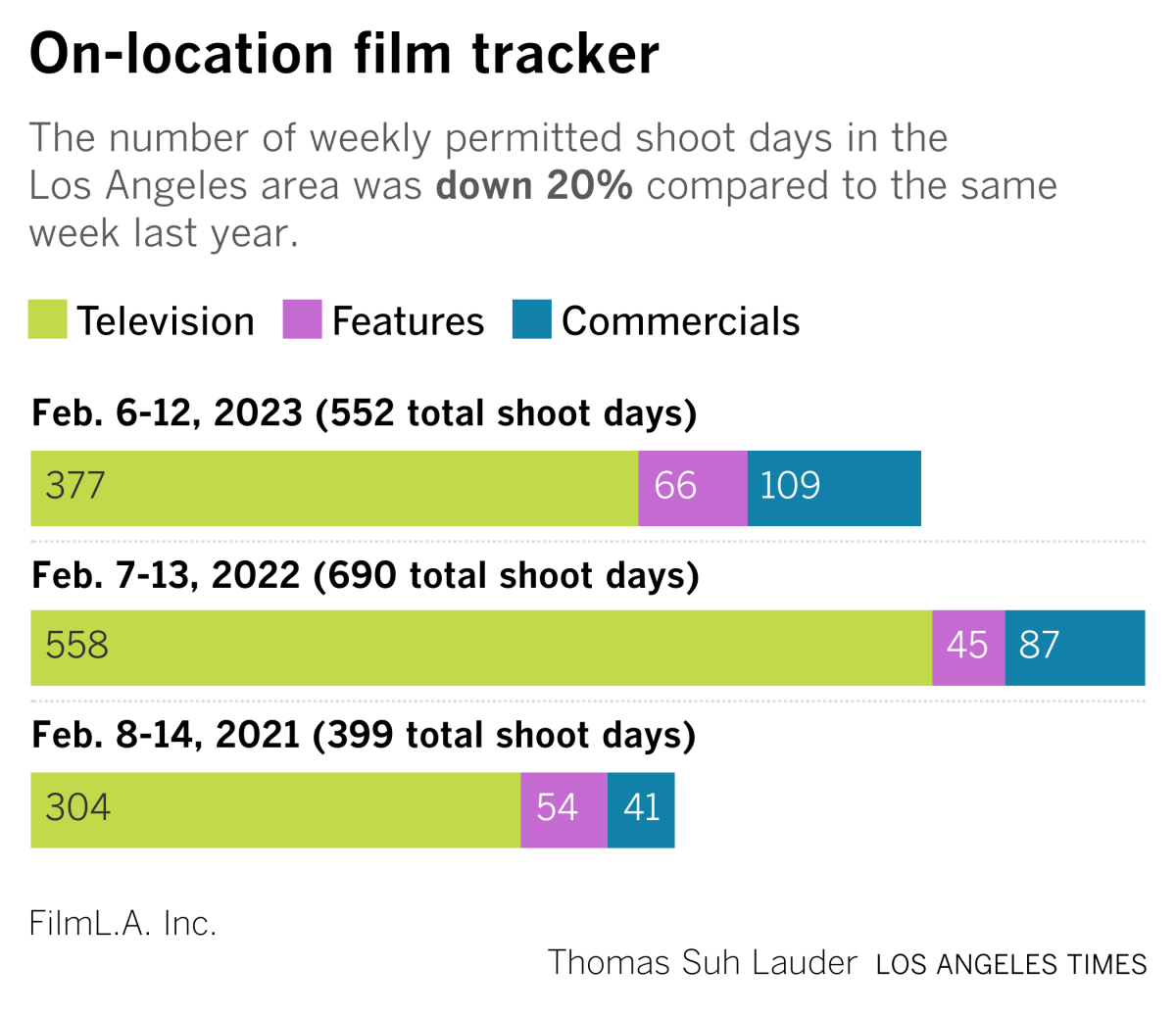As Disney looks for cost cuts, what’s the future of Hulu?

- Share via
Welcome to the Wide Shot, a newsletter about the business of entertainment. Sign up here to get it in your inbox.
Walt Disney Co. averted a nail-biter proxy fight, and all it took was for Chief Executive Bob Iger to promise 7,000 job cuts. That’s clearly an oversimplification, though it’s easy to look cynically at Disney’s cost-cutting measures — targeting $5.5 billion in savings, including $3 billion from content cost over the next few years — as a reaction to Nelson Peltz’s pressure campaign against the company.
But the need to rethink streaming (still the company’s “future,” according to Iger) and rein in costs would’ve existed with or without Peltz’s “Restore the Magic” attacks. In important ways, Disney’s austerity measures are just the biggest example yet of the retrenchment that has happened across the media and entertainment industry when it comes to the business of streaming.
Legacy media companies invested heavily in movies and TV shows to put on streaming services that made viewers feel as if they were getting the content on the cheap. And they were. Disney and Iger were particularly aggressive about giving viewers a bargain, with a starting price of $6.99 a month for Disney+. At the time, it was all good. Wall Street loved the subscriber growth story, and stocks were climbing.
But eventually the market turned against the strategy of pursuing subscriber growth at all costs, and now employees are paying for it. Add in a possible recession and a slowdown in the advertising market, along with the ongoing unraveling of the pay-TV bundle, and of course there are going to be layoffs. Anyway, that’s the layperson’s summary of the entertainment industry during the last year.
Iger’s cost-cutting plan is meant to help make Disney+ profitable by the previously targeted 2024, already a bold goal after its direct-to-consumer division (which also includes Hulu and ESPN+) lost $1.1 billion during the most recent quarter and $1.5 billion the quarter before that.
Which leads to one of the more interesting and longest-lasting questions facing Disney during the next year or so: Will Iger sell Hulu?
Disney owns two-thirds of Hulu and has long been expected to purchase the remaining 33% from Comcast as early as January 2024, paying some $9 billion. The company acquired a majority stake of Hulu through its $71.3-billion acquisition of 21st Century Fox in 2019. Gaining control of the “Handmaid’s Tale” streaming service has been touted as one of the big benefits of that deal.
However, Iger last week was clear in his intention to be much more selective about “general entertainment” content (i.e., everything that doesn’t obviously fall under an easily identifiable Disney brand). That has, of course, sparked speculation that Disney might be a seller of Hulu instead of a buyer.
“Everything is on the table right now” when it comes to Hulu, Iger told CNBC last week, adding that he was “concerned about undifferentiated general entertainment, particularly in the competitive landscape that we’re operating in.”
Disney declined to comment.
Iger has been circumspect. He isn’t saying he wants to sell Hulu, though neither is he saying that he’s committed to fully owning it. There are reasons he might want to keep the Santa Monica-based service. Hulu has about 43.5 million subscribers, or 48 million when you include the 4.5 million who pay for its version with live TV channels. Its average revenue per user (excluding the live TV package) is $12.46 a month, versus the $5.95 Disney+ generates in the U.S. and Canada.
It’s the third-biggest streamer in the U.S., in terms of time watched, with 3.4% of all TV set viewing, according to Nielsen’s monthly pie chart. That puts it behind YouTube (8.7%) and Netflix (7.5%). And it’s where Disney streams its award-winning FX, Searchlight and ABC shows, though that programming appears on Disney+ in other countries.
But there are reasons to sell too. Disney’s debt stands at $45 billion, and while Iger told CNBC that leverage is not a huge concern right now, he noted that he’s “intent” on reducing Disney’s borrowings.
Rich Greenfield, at LightShed Partners, has long questioned the necessity of Hulu to Disney. Despite some brilliant shows, including “The Bear” (which appeared on countless year-end best-of 2022 lists, including ours), “Only Murders in the Building” and “The Dropout,” the unit hasn’t had many home runs in terms of viewership.
“It is hard to see why Hulu is a must-have asset regardless of whether or not Disney chooses to continue investing in adult-focused programming for Disney+ or pivot solely to kids/family programming,” Greenfield wrote in a blog post before Disney reported earnings. It would be ironic if Disney actually came around to Greenfield’s way of thinking.
But would Comcast be a willing buyer for the rest of Hulu, and if not, would anyone else be willing to pay for it? The Philadelphia telecommunications giant would have to fork over around $20 billion to acquire Disney’s stake in Hulu, which, as Michael Nathanson pointed out in a recent note to clients, is more or less a shell for reruns without Disney’s original content coming in. Plus, Comcast already has Peacock, which is growing but losing money. Companies are trying to spend less on streaming, not more.
Nathanson suggests there may be a compromise that benefits both companies. Disney and Comcast could renegotiate their partnership as a joint venture, split 50-50. That would return Hulu to a consortium-backed model similar to its origins as a streaming company owned by multiple competitors.
Such a change would come with its own complications for Hulu, which at times seemed like a child caught in a tense four-way marriage when its ownership was split between Disney, Fox, Comcast and Warner Bros. (Time Warner, then AT&T). And Comcast and Disney have been fierce rivals. Recall that it was a bitter contest between Iger and Comcast CEO Brian Roberts that bid up the value of Murdoch’s Fox assets before Disney ended up with them.
Questions remain about what a co-ownership arrangement would look like. How would a half-owned Hulu operate alongside Peacock, which is just starting to gather steam and has a similar mix of shows, unlike Disney+, which until recently had minimal overlap with Hulu? But there’s an argument that a joint venture could be the best option.
“It would not only offer a better path to profitability, it would also be a major step in rationalizing an industry that is today too fragmented,” Nathanson wrote. “To be sure, it might be a blow to the ego to cede ownership of the customer. But one of the clear lessons of the streaming wars thus far is that ‘owning the customer’ isn’t all that it’s cracked up to be.”
It’s a different story with the other evergreen what-if scenario facing Disney — whether to sell or spin off ESPN. The sports cable network will now be its own reporting unit under Iger’s new structure, which would presumably make a spinoff easier. Not so fast, though. ESPN may be facing cord-cutting and growing sports-rights costs, but it still makes money, as Stephen Battaglio explained in his recent piece. Most importantly, Iger doesn’t seem interested in selling and he was clear that no conversations are currently taking place.
How much profit ESPN generates will become much clearer now that Disney will break out its financial results. It was a crown jewel of the Capital Cities/ABC deal that brought Iger to Disney in the first place. That’s the thing with crown jewels, though. Sometimes you have to auction off your valuables to protect the castle.
Stuff we wrote

— ‘De-influencing,’ ‘dupes’ and deal-hunting. In an inflated economy, social media stars embrace the cheap. Worsening economic conditions could be a stress test for the burgeoning influencer economy. But online creators are pivoting by telling viewers what not to buy.
— Netflix inches closer to kicking you off your parents’ account. Or vice versa, in the case of some of our in-laws. New updates to Netflix’s password-sharing policies are being rolled out in Canada, New Zealand, Portugal and Spain. The U.S. could be next.
— Mary McNamara’s theory on the real reason for AMC’s price hikes on ‘better seats.’ Tiered pricing based on “sightline” seating isn’t about the prices; it’s a push to drive premium membership as a model.
— ICYMI. The will-he-won’t-he of President Biden’s proposed Fox Super Bowl interview got very weird. Rust updates: Family of Halyna Hutchins sues Alec Baldwin and others for ‘Rust’ shooting. Baldwin seeks to disqualify special prosecutor.
Number of the week

A dramatic finish for Super Bowl LVII gave Fox the game’s third-largest audience ever, according to preliminary audience figures from Nielsen. The 38-35 victory by the Kansas City Chiefs over the Philadelphia Eagles was watched by an average of 113 million viewers, including 7 million people who watched on streaming devices and 951,000 viewers who watched the Spanish-language telecast on Fox Deportes. The tally was near the record set in 2015, when 114.4 million viewers watched the New England Patriots beat the Seattle Seahawks, 28-24, on NBC. Fox had the second most-watched Super Bowl in 2017 (113.6 million).
Runner-up: $900 million. The Michael Jackson estate won’t stop ’til it gets enough. Variety reports that the estate is nearing a sale for half its interests in the late pop star’s catalog in a deal worth $800 million to $900 million, which would be the biggest transaction for an artists’ rights package to date. The boom in this part of the music market sure isn’t over yet.
Marketing madness
Super Bowl 2023: Times television critic Robert Lloyd reviews the Super Bowl ads, which went lighter, starrier and boozier this year, with appearances from Serena, Joni and (in a somewhat surreal move) the “Breaking Bad” guys. Long live Tuco. Cryptocurrencies, as expected, sat out the festivities. Plus, here are all the movie trailers that aired, from “Scream” to “Creed III.”
#Family: Speaking of movie previews, Jen Yamato covered the premiere of the “Fast X” trailer (yes, movie trailers have in-person premieres) and, man, what a time to be a fan of that particular $6-billion franchise. During a red-carpet interview with Variety, Vin Diesel compared making the “Fast” saga to “The Lord of the Rings” author J.R.R. Tolkien writing his Middle-earth classics. Tyrese Gibson compared Diesel to “Jesus himself.” Incredible stuff.
Best of the web
— BeyHive, activate! Meet the Beyoncé superfans who refused to be defeated by Ticketmaster. (Wall Street Journal)
— Twitter turmoil. Elon Musk fired a top Twitter engineer over his declining view count. (Platformer)
— Almost everyone in my timeline hates AMC’s new pricing plan. Peter Kafka makes the case for why it’s good, actually. (Vox)
— Reviews for “Unscripted,” James B. Stewart and Rachel Adams’ book on Sumner Redstone, are here. (NYT/WaPo)
Film shoots
On-location shooting last week was down 20% from the same period of time in 2022. TV drove the decline. Commercials and features were up.

Finally ...
The movie trailer that got the biggest reaction from the Eagles fans at my Super Bowl party (sorry guys) was — believe it or not — Amazon Studios’ spot for “Air,” starring Ben Affleck, Matt Damon, Viola Davis, Marlon Wayans and Chris Tucker in the story of the creation of Air Jordans. Go figure! The film is going for an exclusive theatrical release.
The Wide Shot is going to Sundance!
We’re sending daily dispatches from Park City throughout the festival’s first weekend. Sign up here for all things Sundance, plus a regular diet of news, analysis and insights on the business of Hollywood, from streaming wars to production.
You may occasionally receive promotional content from the Los Angeles Times.




